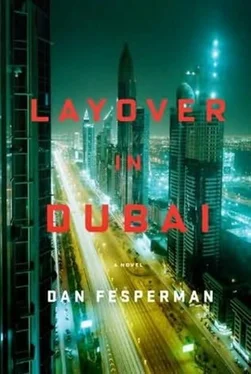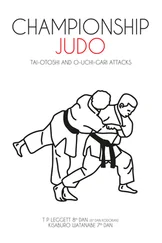“Weak, but steady. Like before.”
“How much longer, then?” the Frenchman asked.
“I told you, I’m not experienced with anesthetics. This is all guesswork.”
“You’ve established that quite clearly, but-”
“Please!” Laleh said. “He did the best he could. And my friend is safe.”
“Provided he ever wakes up. And if he does, will he walk and talk, or just lie there forever like a fallen tree?”
As if in reply, Keller’s body twitched, a spasm across the torso. Then his right hand lifted slightly. The fingers fluttered as if playing a trill on an imaginary piano.
“It’s alive!” the Belgian said, in his best Dr. Frankenstein.
The Frenchman giggled nervously. Laleh and her countryman held their tongues. All four watched intently for further signs of consciousness. Keller opened his eyes, and with a soft groan he slowly raised his head from the couch, sliding back his arms until he was propped on his elbows. He groggily scanned the room, seemingly as shocked as a newborn to suddenly find himself among the living. Time of rebirth: 4:47 a.m.
Laleh stepped nimbly between the Frenchman and the Belgian. She bent down and gently placed a hand to his cheek. Sam blinked slowly, then blinked again. Finally he spoke, his voice a croak.
“Where the hell am I?”
The others exhaled as one.
“My office,” Laleh said. “Welcome back.”
“I think now he will be okay,” the Emirati said in apparent relief.
“In your expert medical opinion?” the Frenchman asked.
“That really will be enough, Jean,” Laleh said. “And I can take over from here. Thank you. Thanks to all of you.”
The three men nodded, glancing back at Sam as they departed without a further word. With the drama apparently over, weariness was now evident in their posture. It was still dark outside the big window. The building, bustling by day, was silent.
Sam felt as if he had just climbed out of a deep hole of drugged oblivion. Considering his flash of panic during his last previous moment of consciousness, he was vaguely pleased to have awakened at all. As far as he could tell, he was still in one piece. No apparent bruises or savage wounds, except for the poultice still taped around the cut on his arm.
“That smell,” he said, remembering the hand clamping across his nose and mouth. “It was kind of sweet. What did they give me?”
“Halothane,” Laleh said. “On a handkerchief. From a brown bottle Massoud took from the hospital. He’s an orderly, not a doctor, but he thought it might come in handy. Then when he saw those men outside your room, I think he panicked. Plus the police were coming. Three cars that passed right by us on the way out of there. So I guess he decided it would be better if you came without a commotion. He probably used more than he should have.”
“Those men? Which men?”
She described them-three beefy Bengalis, two with clubs and one with a knife. They had been gathered uncertainly by the door to Sam’s room, as if awaiting a call to action. Fortunately they had been easily frightened off by the sudden appearance of Sam’s rescue party, which had strolled toward them seemingly out of nowhere just before midnight.
“Ali called me late last night to say that he had found my father. He was going to pick him up at the Central Jail. In the morning he was going to get you as well. But when I saw your e-mail it sounded too dangerous to wait any longer, so I rounded up a few friends and did what I could. Do you think the police found out you were there? Or maybe someone saw the Bengalis and phoned for them.”
“I’m not sure. With the Bengalis it was personal. Superstitions and grudges. The police? Who knows. Either way, it’s a good thing you came.”
Sam sat up straight, groggy but not in pain. He was on the couch in the foyer of Laleh’s office, out by the receptionist desk with the big window behind it. He seemed to have his wits about him, but his motor senses were enveloped in a thin fog. There was a slowness to his movements that was almost pleasant, as if some higher authority had granted him dispensation to dial things down for a while. He looked up at Laleh and smiled, aware that it was probably a goofy expression, as idiotically faithful as a dog’s. It seemed to please her, nonetheless, because she smiled back, and then sat beside him on the couch.
“Don’t you have a curfew or something?”
Laleh’s expression darkened.
“I thought my mother would strangle me on the way out of the house. She still doesn’t know where I am. I’ve never done anything like this before. When my father comes back home…” Her voice trailed off with a shudder.
“You said he was in jail?”
“They beat him up. Out cold, like you. I’ll call Ali after sunrise for an update. He said he was taking my father to the Minister’s house, for safekeeping.”
“So he’s still in hiding?”
“So are you. I don’t know where we’ll put you next.”
Laleh checked her watch and shook her head, frowning.
“What’s wrong?”
“My mother. She really will kill me. One of my brothers chased me halfway down the driveway. I was lucky to get away at all. And I forgot to bring my abaya, of course. That was probably the first thing she noticed.”
“Hey, calm down. I’ll vouch for you.”
In his relaxed state of mind he reached up and unthinkingly touched her chin to turn her face toward him. She didn’t flinch, but her eyes widened, which made him realize exactly what he was doing. He dropped his hand, embarrassed.
“Not that me vouching for you will do you any good, I guess. The crazed foreigner, with his libertine ways from abroad.”
She smiled.
“You’re still feeling the effects, aren’t you? You’ve never talked this way before. Not with me, anyway. You’re so relaxed.”
“Maybe halothane is good for me. Who were those guys?”
“I grew up with Massoud, the one from the hospital. He’s a friend of my little brother Hassan. Jean works in the building, a cameraman for French television. He shoots freelance video for us. The Belgian, Paul, is a friend of Jean’s. I think he works for Reuters.”
“I’m guessing Jean and Paul have never met your parents.”
“They’re part of the network my parents know nothing about.”
It wasn’t a boast, or a put-down. It was merely a statement of fact, a casual affirmation of her competence in having rounded up the necessary manpower for a rescue mission on short notice, as if such business was all in a day’s work. And maybe it was.
“What do we do now?” he asked.
“Wait for morning.”
“Do you have coffee? Everything’s fuzzy, but I don’t want to go back to sleep.”
“I’ll brew a pot.”
She left for a moment while he stared dumbly through the darkened window into the pre-dawn sky. He heard running water and, soon afterward, the pop and gurgle of a coffeemaker. It reminded him of his first visit to Sharaf’s house, right before her father burst in on them, scolding and disapproving. She was right. Her parents would be furious. He smiled dopily.
Laleh returned with two steaming mugs. She again sat beside him on the couch-just as close as before, he was pleased to note. It was cozy, sipping coffee with her. Or maybe the anesthetic was still working its magic.
“So what will he do to you?” Sam asked.
“My father? Punish me, I suppose. The first thing he usually tries is to demand that I quit my job. When that doesn’t work he changes my curfew for a while.”
“Even earlier than ten?”
She shrugged.
“It’s hard to blame him. Not that I won’t. But I am so different from all the girls he grew up with. You really have no idea how far he has come.”
Читать дальше












